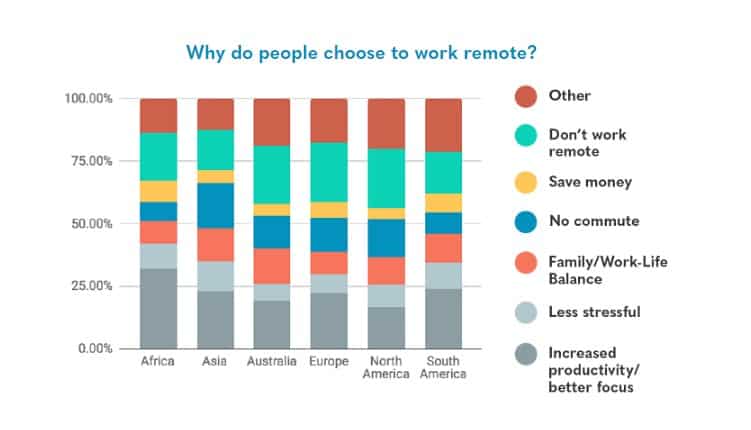What does remote working mean?
Remote work is a job or a professional activity that is done outside of a traditional office. It is also called sometimes telecommuting or teleworking. Many people refer to it as “working from home”. Though working from home does not necessarily mean you have a fully remote job as we’ll see a bit later in this article.
You will hear or find more often than not the term “nomadic working” which is a buzz word for remote working in the digital sphere. This is derived from the expression “digital nomad” which refers to individuals who work remotely using information and communications technology. Most of the times, they work from remote locations thousands of miles away from the company’s HQ(if there is one)
The range of remote work is wide and can vary depending on the company policy and the lifestyle you choose. Some people can pick a working style where they go a few days in the office and are allowed to work from home a few days a week, while others might never meet their colleagues face to face because the company is fully remote.
More than 40% of remote workers plan to work remotely more frequently in the future, and more than 50% of on-site workers want to work remotely in the future
After doing a bit of research, we noticed that the concept of remote work (or nomadic working as some people call it) exists in different forms and it can be categorised as it follows:
1. Office-based with an option to work from home
These employers have one or more physical offices,but they give employees the choice to work from home at least once per week. In this setup, usually the remote employees live in the same city and they meet in the office frequently.
PRO TIP: You can always ask at the interviews if they have this option as a perk because more and more companies are giving this as a benefit to their workers.
2. A remote team within a time zone (same country or state)
This is a truly remote setup with no expectations to show up to the office (if there even is an office).
3. A remote team spread around the world and across multiple time zones
This type of oranisation might include several offices in different parts of the world where the team mates overlap just a few hours a day. This arrangement requires more organisation and communication to achieve the goals.
Remote workers are 29% happier in their jobs than on-site workers.
4. A fully distributed team with nomadic team members
This is the ultimate form of remote working. All the members of the teams are working remotely and completely independent from different locations around the world. They might be traveling regularly so they are changing their time zones on a
The “working nomads” might meet once or twice per year for special company events(parties, get-togethers,etc) and to meet and greet each other.
5. You are nomad freelancer/contractor and work from remote locations with a company with an HQ
You have your own small company registered and you choose a country to live in or hop around and do the work for your client.
You use remote work tools like Trello, Zoom, Slack to present your results to the client or collaborate with other people in the client’s company
Here are some of the popular industries where this type of freelance work can be very lucrative:
- Coding
- Digital marketing
- Social media
- Cloud computing consulting
- Design
- You own a company and are yourself a nomad whilst having a globally distributed team of nomads/freelancers
If you are new to this or dream about starting, you could start small and take on some side projects whilst keeping your day job to pay the bills. Once you’ve built your client base and started making some serious cash from freelance, you can get rid of the day job and just take care of your new portfolio of clients. What I want you to think about is that you don’t need to earn that much if you want to live in certain cities in Asia for example.
You can have a look on freelance websites like Upwork and Flexjobs.com to get an idea of the market and prices.
The number of people who work from home has increased by 140% since 2005 – Global Workplace Analytics
So does remote work mean working from home?
The answer is yes and no.
Yes, working from home is a form of remote working, but this concept is a lot wider than only doing work from your house as we’ve seen above.
Operating from your house or flat is included in the notion of remote working, however remote work is broader and can offer more than just working from your own place.
What are the pros and cons of remote work?
As you will see below, working remotely doesn’t mean only milk and honey.
Benefits of remote working. The PROs
- Flexible lifestyle and a better work-life balance
This is probably the most obvious advantage of working remotely. Being able to organise your work around your life schedule and not the other way around is great.
Also, not having a certain time to start the work day or not having to commute is another great advantage of remote working.
For example, I personally take longer weekends(Thursday to Monday) and work from a remote location in Europe to gain some time by using the evenings there and have the full weekend to enjoy because I’m already there.
I also save a lot of time by not commuting (takes me 1 hour each way) daily to my workplace which is a great perk. This is valuable time that I’m reinvesting in studying or doing sports.
Think about this time you can unlock and use it to develop yourself. It’s great!
If you are a parent, then this working style is a great match for you too. Parents have the ability to start work earlier in the day from home so that they finish earlier and pick up the kids from school with no commute at all. Suddenly, they will gain a few more important hours for family time.
Studies back this up as well. In a research made by Owl Labs on 1,202 remote employees in the US, 91% of them reported their biggest reason was the work-life balance.
Working remotely can also offer you freedom from your geographical location. When you are looking for a job or a project, you can look for companies that previously would have been impossible to work for due to where you live. Your options just open up much more when you look for a remote role.
So, if you want to travel around the world and make some money on the go, then nomadic working is for you.
- Reduced costs
You are able to save money on your commute, food and other costs if you work from home. Think about all the money you could lay aside and invest in some different asset classes for your retirement for example.
Let the money work for you and plan your future. If you are new to money management and want to understand how to do it, checkout this intro class on types of assets from Investopodia
Alternatively, if you don’t want to deal with the hustle of managing your investments or don’t know anything about it, there is a solution for this as well. Invest your money in active managed funds and get rid of the management stress.Let the fund managers work for you in exchange for a commission.
Contributing with a few hundred dollars a month in these funds could make a huge difference in 20-30 years due to the compounding effect.
- Improved health and wellbeing whilst reducing stress
This one is obvious. No more comute and stress, but more time for yourself. You can hit a morning run in your nearby park or go for a swim whenever you wish during your workday from home. Forget about the daily commute in your car or metro and organise the workday and house work as you wish.
- Increased productivity and better focus

In a global study made in 23 countries, on 3028 employees, the company OwlLabs found out that the #1 reason that people choose to work remote is increased productivity/better focus followed by #2 no commute
Disadvantages of remote working. The CONs

Coworking space in Canggu Bali. Source:Outpost
- Loneliness and low engagement
Research shows that remote workers are more likely to quit because of loneliness as well as low engagement within the company. The reason why co-working spaces like WeWork exist is because people want the human interaction as well as the events and networking. If you work and travel it’s really hard not having friends and family around. Also, not interacting in person with the coworkers can also be difficult. Communicating via Skype or Zoom it’s just not the same.
I personally have been there and I did miss socializing with my colleagues a lot of time. I found this being the biggest issue in my remote working career.
- Problems unplugging after work
This is probably the most common issue with people working from home. Many times it’s very hard not to check the emails or open the laptop and peak on your emails. Especially if you’re using the work laptop as your personal one as well. Make sure you turn off the notifications after a specific time and try to have two different computers, one for work and one for your own use.
You may also find it difficult to stop working as you haven’t set any physical boundaries between your work and living spaces. Experts recommend to setup your home office in a dedicated area in your flat or house preferably in a spare room which has plenty of natural light and all the ergonomic accessories you need for a comfortable day.
- Missing out on the usual office activities
Being in the office, especially in one with a cool culture can be very beneficial for the spirit and productivity. You can exchange ideas, enjoy the social activities or just exchange ideas with your colleague on a daily basis.
However, when you work alone and sometimes far from the office HQ, you are missing out on all these activities. Life as a solo freelancer or remote employee can get pretty depressing sometimes if you cannot find a group to join.
Ideally, you would want to a) find a community in your city/location where you work from remotely or b) pay a visit to your company’s HQ or office from time to time.
Why is remote working trending?
Remote work is certainly on the rise. In fact, half of the employees globally are working outside their main HQ for at least 2.5 days a week already a recent study shows.
It’s worth learning about all the different ways of working remotely and understand how you could take advantage of all that it has to offer. It allows you to tailor your day to your specific needs and requirements. Perhaps you’re the most productive in the evening rather than in the early mornings. With remote work, you’re free to make the decision as to how and when you complete your tasks.
So long as you meet your deadlines, you can choose your own working style. It’s easy to see why it’s becoming an increasingly popular arrangement for employees all over the world.
If you are a millennial who’s just starting his/her trip in the remote working adventure, make sure you check our full guide on where to find entry level remote jobs .
It’s worth keeping in mind that smaller companies are 2X more likely to hire full-time remote employees according to a study made by Owllabs.
Your turn now
- Have you worked remotely until now in any way,shape or form?
- Can you describe your experience and what were the main challenges whilst working remotely for this type of organizations?
- Is there another level of remote organisation we haven’t mentioned?

